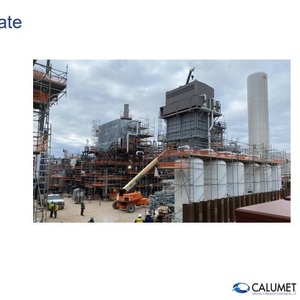Calumet: SAF production at Montana biorefinery to begin in April

March 15, 2023
BY Erin Krueger
Calumet Specialty Products Partners L.P. has announced the renewable diesel unit at its Montana Renewables biorefinery operated well during the fourth quarter of last year. Additional renewable hydrogen production capacity, a feedstock pretreatment unit and sustainable aviation fuel (SAF) capacity are expected to begin operations this spring. Calumet is also considering a major SAF expansion project. Company officials discussed current and future operations at Montana Renewables during a fourth quarter earnings call held March 15.
Calumet in February 2021 announced plans to produce renewable diesel at its petroleum refinery in Great Falls, Montana, by reconfiguring its oversized hydrocracker to process up to 15,000 barrels per day of renewable feedstocks, producing renewable diesel and SAF. In November 2022, the company said it was considering plans to boost SAF production at the plant to as high as 230 MMgy.
Calumet late December 2022 reported the biorefinery had generated a full month of on-spec renewable diesel and had commenced rail shipments of the product. The facility currently has the capacity to produce 6,000 barrels per day. Capacity is expected to increase to 12,000 barrels per day with the commissioning of renewable hydrogen, SAF and feedstock pretreatment systems later this year.
Advertisement
Advertisement
During the March 15 earnings call, Calumet CEO Todd Borgmann said that the company’s renewable diesel unit came online during the final quarter of last year and has ran exceptionally well. Catalyst performance and throughput rates have been as planned as the facility runs up to its hydrogen limit he said. A renewable hydrogen unit developed at the Montana Renewables site began startup on March 4, he said, which will allow the biorefinery to ramp up production to 12,000 barrels per day.
The feedstock pretreatment unit under development at the site will be mechanically complete in March and operational in April, according to Borgmann. SAF production is also scheduled to begin in April, he said.
Advertisement
Advertisement
According to Borgmann, initial SAF capacity will be in the range of 2,000 to 4,000 barrels per day. The company is also considering a pivot to what it calls max SAF, which would expand total renewables capacity to 18,000 barrels per day, including 15,000 barrels per day of SAF. Borgmann said Calumet has already purchased the reactor needed to implement the max SAF expansion, ensuring that the company can move quickly if it decides to move forward with the expansion or brings in a partner that wants to progress the project expeditiously.
Related Stories
CoBank’s latest quarterly research report, released July 10, highlights current uncertainty around the implementation of three biofuel policies, RFS RVOs, small refinery exemptions (SREs) and the 45Z clean fuels production tax credit.
The U.S. Energy Information Administration maintained its forecast for 2025 and 2026 biodiesel, renewable diesel and sustainable aviation fuel (SAF) production in its latest Short-Term Energy Outlook, released July 8.
XCF Global Inc. on July 10 shared its strategic plan to invest close to $1 billion in developing a network of SAF production facilities, expanding its U.S. footprint, and advancing its international growth strategy.
U.S. fuel ethanol capacity fell slightly in April, while biodiesel and renewable diesel capacity held steady, according to data released by the U.S. EIA on June 30. Feedstock consumption was down when compared to the previous month.
XCF Global Inc. on July 8 provided a production update on its flagship New Rise Reno facility, underscoring that the plant has successfully produced SAF, renewable diesel, and renewable naphtha during its initial ramp-up.
Upcoming Events










